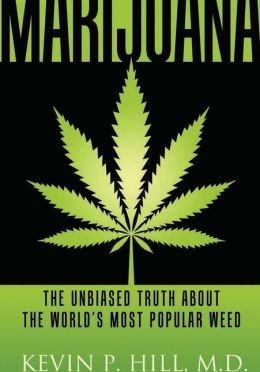By Sally Schindel, Treasurer, Arizonans for Responsible Drug Policy
Dr. Kevin P. Hill’s book, Marijuana: The Unbiased Truth About the World’s Most Popular Weed covers a vast amount of ground in 206 pages. The Harvard—McLean Hospital physician sets out to explain three big myths: that marijuana’s not harmful, that marijuana is not addictive and that quitting marijuana involves no withdrawal. The book is easy to read. It was published in 2015.
An addictions specialist, Dr. Hill provides an unbiased, honest and factual report. He makes the complex issues associated with decriminalization and legalization understandable. Dr. Hill concludes that legalizing “medical” and recreational marijuana are feasible ideas depending on how the regulations are written.
Policy is ahead of the science right now, an unfortunate predicament. Data showing the harms of marijuana is clear, strong and growing. Since most people aren’t aware of the potential dangers of the drug, an education effort at this time is most important. With current trend of increased use and decreased perception of risk, expect things to get worse before they get better. Those who support medical marijuana and legalizing marijuana are buoyed by false logic and very little science.
Our rush to “medicalize” and legalize puts citizens at risk. Clinical trials are designed to limit risk to participants, reducing chances participants might be harmed. That takes time but it protects patients from harm. This public policy has not been developed with risk minimization, balancing medical needs and personal liberty. Rather it has been developed with serious flaw s.
s.
The political process is set up to favor simplified, polarized positions rather than considered, balanced and complex ones. The vitriol in the marijuana debate has hindered the development of effective policies. There is a great deal of passion on both sides of the issue with little attempt to compromise.
Solutions to the Problems with Legal Pot
Dr. Hill suggests many solutions to the mess that has been created. He suggests an examination of what has been done right and wrong with tobacco and alcohol and applying it to marijuana. Other important points he makes are:
* Stop glamorizing marijuana; portray it truthfully as the addictive drug it is. No advertising allowed.
* Place the burden for addiction treatment on those involved in production, sale and use. Make it difficult and expensive to use with excise taxes.
* Complete additional clinical trials in development of behavioral interventions and medications for those addicted to marijuana.
* Clinical trials evaluating cannabinoids as treatments for medical problems are essential.
* Additional long-term studies of psychiatric disorders and medical conditions are needed.
* Research on the effects of marijuana on driving is sorely needed.
* Add evidence-based education integrated into health curriculum in sustained frequent programs.
* Gain broader support from local and national leaders to support educational efforts.
* Place emphasis on science and not half-truths or rhetoric.
The marijuana issue is not going away. The drug is potentially useful and harmful at the same time. Recognize its dangers, as the alcohol and tobacco industries must do. Strengthen DUI laws, emphasize responsible use and don’t oversimplify which leads to loss of objectivity and credibility. This is a very complex and serious drug.

